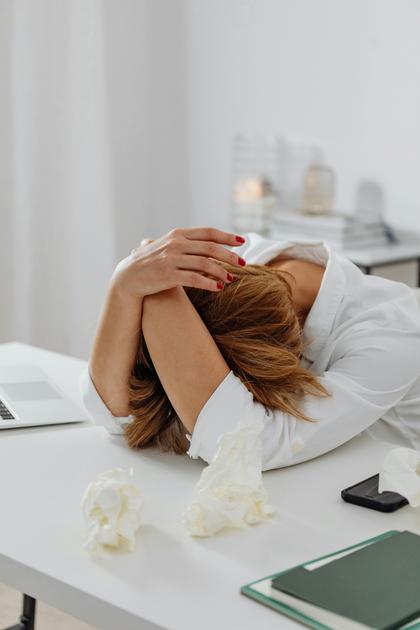Stress and Hair Thinning in Women: Discover a Hidden Cycle
Have you ever felt overwhelmed by stress and hair thinning? You’re not alone. Many women over 30, facing issues like fatigue, insomnia, and hormonal imbalances, often find themselves caught in a frustrating cycle that can impact their confidence and well-being. Understanding the emotional toll and physical results of stress can be the first step towards breaking free from this cycle. In this article, we delve into the links between stress and hair thinning, sharing stories and insights to help you reclaim your vitality.
Understanding the Connection Between Stress and Hair Loss
For many women, everyday life can bring a whirlwind of challenges. From juggling work commitments to managing family responsibilities, stress becomes a relentless companion. As stress mounts, its impact can be seen in various forms, with hair thinning being a serious concern. Numerous studies reveal the strong link between stress and hair loss, particularly for women. Stress triggers hair follicles to enter a resting phase, which means fewer new hairs will grow. Eventually, this leads to noticeable hair thinning.
It’s important to recognize that hair is often a reflection of our overall health. When stress levels skyrocket, they can disrupt our hormonal balance and nutritional status, making it easier for hair thinning to occur. Understanding this connection is the first step in breaking the cycle of stress-related hair loss.
Common Stress Triggers for Women Over 30
As we navigate through life, especially after turning 30, certain stressors can become more prevalent. Here are some common triggers that many women experience:
- Work Pressures: Increased responsibilities and high-stakes projects can lead to overwhelming stress levels.
- Family Dynamics: Balancing relationships with children, partners, and elderly parents often adds to emotional strain.
- Financial Concerns: Worries about budgeting, saving, and overall financial security can create anxiety.
- Health Issues: Managing personal health or chronic conditions can be a continuous source of worry.
- Life Changes: Transitions such as divorce, relocating, or changing jobs can drastically affect mental well-being.
Identifying personal stressors is key. Once recognized, you can start to take steps towards managing them effectively.
The Emotional Impact of Hair Thinning
For many women, hair isn’t just hair; it’s an expression of identity and self. When hair begins to thin, it can trigger a cascade of emotional responses. Feelings of insecurity, loss of femininity, and even anxiety about one’s appearance can surface. Many women report feeling:
- Embarrassed: The visible signs of hair loss often lead to self-consciousness.
- Frustrated: Trying different products or treatments without positive results can become disheartening.
- Isolated: Hair thinning can feel like a personal struggle, leaving many feeling alone in their experience.
These feelings are valid and shared by many. Each story is unique, yet the experiences often resonate deeply. Acknowledging these emotions as part of the journey is important.
How Hormonal Changes Play a Role
Hormonal fluctuations are a natural part of life, especially as women reach their thirties and beyond. Conditions like pregnancy, menopause, or even monthly cycles can significantly affect hair health. Estrogen and progesterone levels can influence hair growth cycles and, during times of imbalance or decreased levels, hair may thin more rapidly. Known hormonal changes that can lead to thinning include:
- Menopause: The reduction of estrogen affects the growth of hair.
- Thyroid Issues: Underactive or overactive thyroid can lead to noticeable hair loss.
- Polycystic Ovary Syndrome (PCOS): This condition often leads to hormonal imbalances that can trigger hair thinning.
Being aware of how hormones affect hair can empower women to seek the right assistance from healthcare providers.
Recognizing the Signs of Stress-Related Hair Loss
Understanding the signs of stress-related hair loss is crucial to taking the first steps toward improvement. Often, hair thinning may go unnoticed at first. However, being vigilant about changes can make a difference. Here are some signs to look for:
- Increased Hair Shedding: If you notice more strands in your brush or on your pillow after sleep, it may be a sign.
- Scalp Visibility: Areas of the scalp becoming more visible can indicate thinning.
- Changes in Hair Texture: An overall dullness or a decrease in hair volume can signify issues.
If you recognize these indicators, it’s an invitation to explore stress management techniques and seek the necessary support.
Effective Stress Management Techniques
Taking charge of stress not only helps your mental health, but it can also positively influence your hair health. Here are some proven stress management techniques:
- Mindfulness and Meditation: Daily mindfulness practices can reduce stress levels.
- Regular Exercise: Physical activity releases endorphins, which are natural mood lifters.
- Establishing Healthy Sleep Habits: Quality sleep is essential for overall wellness.
- Journaling: Writing about feelings can help clear the mind and process emotions.
- Seeking Support: Talking to friends, family, or a therapist can provide valuable perspectives.
Incorporating these techniques into your daily routine can combat stress and contribute to a healthier scalp and hair.
Natural Remedies for Thinning Hair
As many explore how to reclaim their luscious locks, numerous natural remedies are making a comeback. These can be both effective and soothing, promoting healthier hair while reducing stress. Consider the following remedies:
- Aloe Vera: Known for its calming properties, it can be applied directly to the scalp.
- Essential Oils: Oils like lavender or rosemary not only smell delightful but promote hair growth.
- Balanced Diet: Nutrient-rich foods rich in vitamins and minerals such as biotin, Vitamin D, and iron can combat hair loss.
- Herbal Supplements: Natural supplements like saw palmetto or ginseng have been linked to improvements in hair health.
These remedies can create a more nurturing routine for both your hair and mind, helping to break the cycle.
Creating a Supportive Self-Care Routine
Self-care isn’t just a buzzword; it’s a vital element in nurturing mental and physical health. Establishing a self-care routine that aligns with your needs can supercharge your ability to combat stress and its physical manifestations. Elements of a good self-care routine may include:
- Schedule Downtime: Carving out time for relaxation and fun can help recharge your spirit.
- Engage in Hobbies: Pursuing passions can serve as an effective distraction from stressors.
- Practice Gratitude: Regularly noting what you’re thankful for can shift perspective toward positivity.
- Stay Hydrated: Maintaining proper hydration supports overall health and well-being.
Incorporating these elements can foster a nurturing environment where both the mind and hair can flourish.
Real Stories: Women Who Overcame Hair Thinning
Many women have walked the challenging path of hair thinning, finding their way back to confidence and vitality. Here are a few inspiring stories:
- Maria: After years of stress at work, she experienced significant hair loss. Through mindfulness practices and nutritional changes, she regained not only her hair but also her self-acceptance.
- Jessica: A long-time sufferer of anxiety, she found solace in yoga and aromatherapy, leading to reduced stress and a full head of hair.
- Fatima: She embraced her uniqueness, sharing her journey on social media, which drew support and helped her manage stress effectively.
These stories serve as a testament that with courage, commitment, and the right tools, one can overcome the struggles of hair thinning amidst stress.
Embracing Change: A Path to Healing
Change can be daunting, yet it often leads to a beautiful transformation. Realizing that stress and hair loss can be interlinked opens up the pathway to healing. Women, it’s time to embrace this change:
- Take Action: Start exploring options that resonate with you, whether they’re natural remedies, stress management techniques, or simply talking to someone.
- Celebrate Small Wins: Each positive step forward is a step toward greater self-love.
- Be Kind to Yourself: Remember it’s okay to feel vulnerable during this journey.
Remember, it’s possible to improve your symptoms and challenges with a structured approach, just as many women have already done. Embrace the opportunity to discover solutions and find healing, ensuring you celebrate your unique beauty every step of the way.













